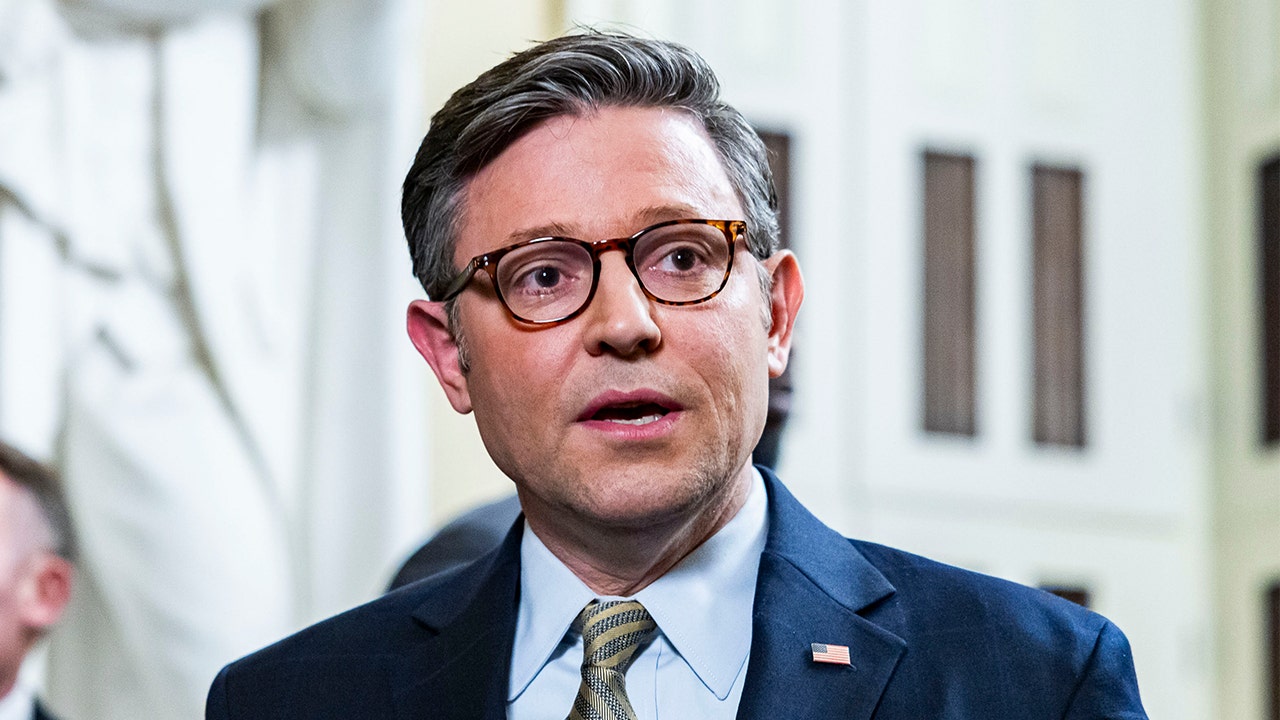World
Canada alleges Indian minister Amit Shah behind plot to target Sikh separatists
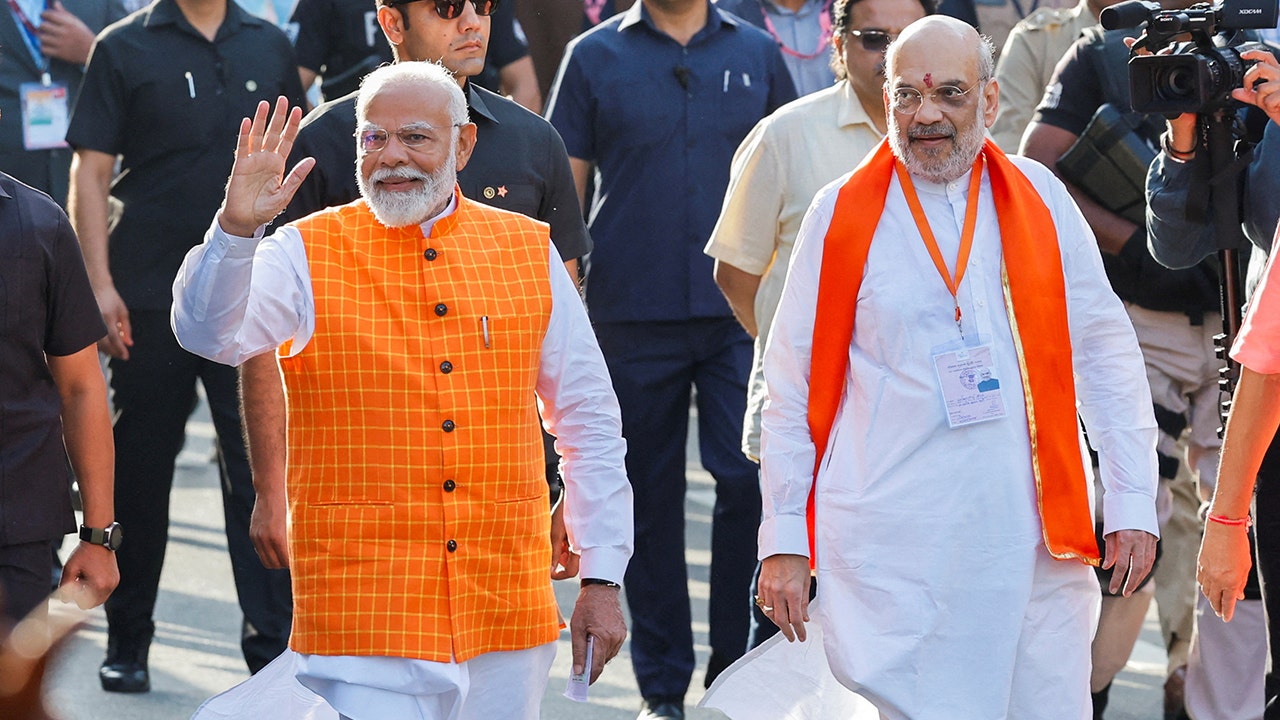
The Canadian government alleged on Tuesday that Indian Minister of Home Affairs Amit Shah, a close ally of Prime Minister Narendra Modi, was behind the plots to target Sikh separatists on Canadian soil.
The Indian government did not immediately respond but has dismissed Canada’s prior accusations as baseless, denying any involvement.
CANADA-INDIA TIES COULD TAKE A LONG TIME TO RECOVER
The Washington Post newspaper first reported that Canadian officials alleged Shah, considered the number two in the Modi government, was behind a campaign of violence and intimidation targeting Sikh separatists in Canada.
Canadian Deputy Foreign Affairs Minister David Morrison said to a parliamentary panel on Tuesday that he told the U.S.-based newspaper that Shah was behind the plots.
“The journalist called me and asked if it (Shah) was that person. I confirmed it was that person,” Morrison told the committee, without providing further details or evidence. The High Commission of India in Ottawa and the Indian foreign ministry had no immediate comment.
The Indian home ministry directed queries to the foreign ministry.
India’s Prime Minister Narendra Modi (L) walks alongside Amit Shah, Indian Home Minister and leader of India’s ruling Bharatiya Janata Party (BJP) on the day he casts his vote, outside a polling station during the third phase of the general election, in Ahmedabad, India, May 7, 2024. (REUTERS/Adnan Abidi/File Photo)
Canada told India about Shah’s alleged role in the plots around October 2023, one Indian government source told Reuters in New Delhi on Wednesday.
But New Delhi thinks the information is very weak, flimsy and does not expect it to cause any trouble for Shah or the government, the source and another government source said.
Both spoke on condition of anonymity as they are not authorised to speak to the media.
India has called Sikh separatists “terrorists” and threats to its security. Sikh separatists demand an independent homeland known as Khalistan to be carved out of India. An insurgency in India during the 1980s and 1990s killed tens of thousands.
That period included the 1984 anti-Sikh riots that left thousands dead following the assassination of then-Prime Minister Indira Gandhi by her Sikh bodyguards after she ordered security forces to storm the holiest Sikh temple to flush out Sikh separatists.
Canada in mid-October expelled Indian diplomats, linking them to the 2023 murder of Sikh separatist leader Hardeep Singh Nijjar on Canadian soil. India also ordered the expulsion of Canadian diplomats.
The Canadian case is not the only instance of India’s alleged targeting of Sikh separatists on foreign soil.
Washington has charged a former Indian intelligence officer, Vikash Yadav, for allegedly directing a foiled plot to murder Sikh separatist leader Gurpatwant Singh Pannun, a dual U.S.-Canadian citizen and Indian critic in New York City.
The FBI warned against such a retaliation aimed at a U.S. resident. India has said little publicly since announcing in November 2023 it would formally investigate the U.S. allegations.
The accusations have tested Washington and Ottawa’s relations with India, often viewed by the West as a counterbalance to China.

World
John Capodice, ‘Ace Ventura’ and ‘General Hospital’ Actor, Dies at 83

John Capodice, a character actor best known for roles in “Ace Ventura” and “General Hospital,” died on Monday. He was 83.
The news was confirmed on the website for Pizzi Funeral Home in New Jersey, although no cause of death was given.
Born in 1941 in Chicago, Ill., Capodice fought for the U.S. Army in Korea from 1964-1966 before moving into an acting career in the late 1970s.
His first role was on the ABC soap “Ryan’s Hope,” appearing in six episodes as Lloyd Lord. A lengthy array of TV guest star credits would follow, including “Seinfeld,” “CSI,” “Ellen,” “Another World,” “Knots Landing,” “Law & Order,” “Will & Grace,” “Spenser: For Hire,” “Kate & Allie,” “As the World Turns,” “Moonlighting,” “Murphy Brown,” “Melrose Place,” “Mad About You,” “Diagnosis Murder,” “Six Feet Under,” “The West Wing” and “Murder, She Wrote.”
On “General Hospital,” Capodice played Carmine Cerullo from 1994-1996 in six episodes of the soap opera.
On the film side, Capodice appeared in the 1994 smash hit comedy “Ace Ventura: Pet Detective,” playing a police officer who is dismissive of Jim Carrey’s titular character. Other big-screen credits include “Naked Gun 33 1/3: The Final Insult,” “Speed,” “Independence Day,” “Enemy of the State,” “The Doors,” “Family Business,” “Q” and “The Doors.” He also voiced a central character in the 2010 video game “Mafia II.”
The Pizzi Funeral Home said that “John was a devoted husband, father and grandfather and will be missed by all who had the pleasure to meet him.” He is survived by his wife, two daughters and four grandchildren.
World
Christians increasingly persecuted worldwide as ‘modern and historical factors converge’
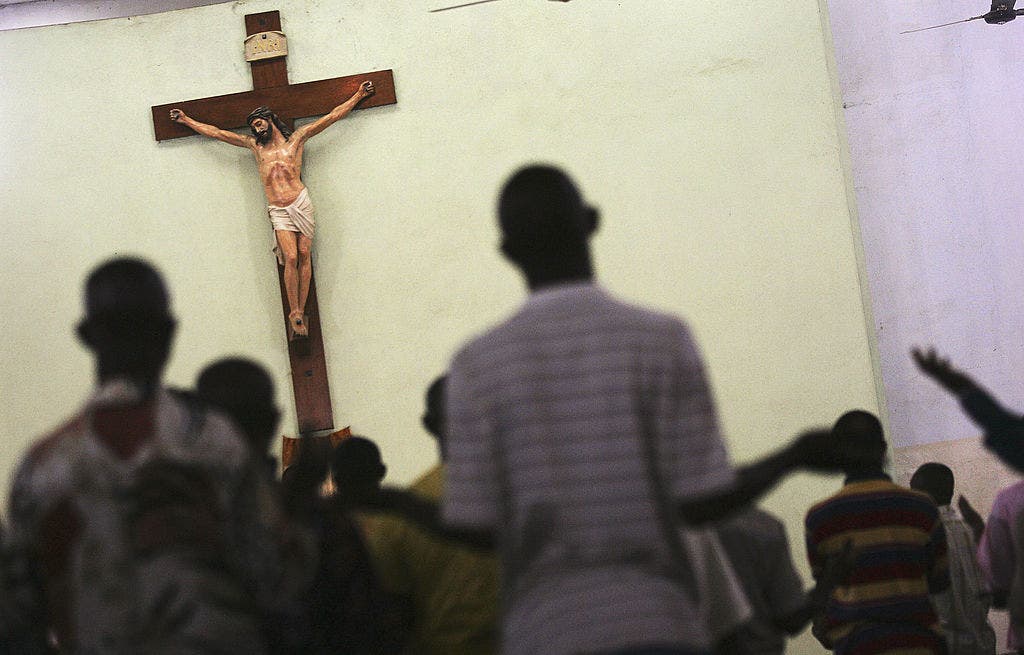
EXCLUSIVE: Reports for years have indicated that religious intolerance is on the rise around the globe in the face of increasing authoritarian rule and the continued spread of Islamic extremism, but a report released Thursday indicates that Christianity, above all others, is taking the biggest hit.
“The world is seeing an increasing push toward oppressive control over religion, particularly Christianity, as a consequence of several modern and historical factors converging,” Jeff King, president of the International Christian Concern (ICC), a non-profit based in Washington, D.C., told Fox News Digital. “Christians face oppression in more countries than any other faith group, with significant challenges in regions like the Middle East, Africa and Asia.”
A report titled “The Global Persecution Index 2025,” released by the ICC on Thursday, outlined which nations have become the biggest offenders when it comes to religious oppression, particularly against Christian populations, and found the majority of religion-based persecution is carried out under authoritarian leaders and by Islamic extremist groups.
The facade of the Church of Saints Peter and Paul in Krakow, Poland, is illuminated in red. Hundreds of cathedrals, churches, monuments and public buildings are illuminated with red lights in order to raise awareness about the persecution of Christians and the issue of religious freedom, as well as in the spirit of solidarity with the persecuted, on Friday, Nov. 25, 2022 in Krakow, Lesser Poland Voivodeship, Poland. (Photo by Artur Widak/NurPhoto via Getty Images)
PRIEST STABBED IN THE FACE DURING MASS AS RELIGION-BASED HATE CRIME IS ON THE RISE WORLDWIDE
The greatest concentration of “Red Zone” nations, countries with the most severe actions taken against Christians, including torture and death, were found in a strip of land in Africa known as the Sahel, which includes places like Mali, Niger and Chad. However, other significantly dangerous nations for the Christian faith were identified as the Democratic Republic of the Congo, Somalia, Afghanistan, Pakistan and North Korea.
There is a mounting trend that shows authoritarian policies are on the rise globally – particularly as geopolitics enter an increasingly fragile period – and has meant more nations are clamping down on religion.
Christians and Muslims are the two largest religious groups in the world and consistently see the highest rates of “harassment” – both physical and verbal – over any other group, according to a Pew Research Center (PRC) report released this month, which analyzed findings from 2022 – data that King also referenced.
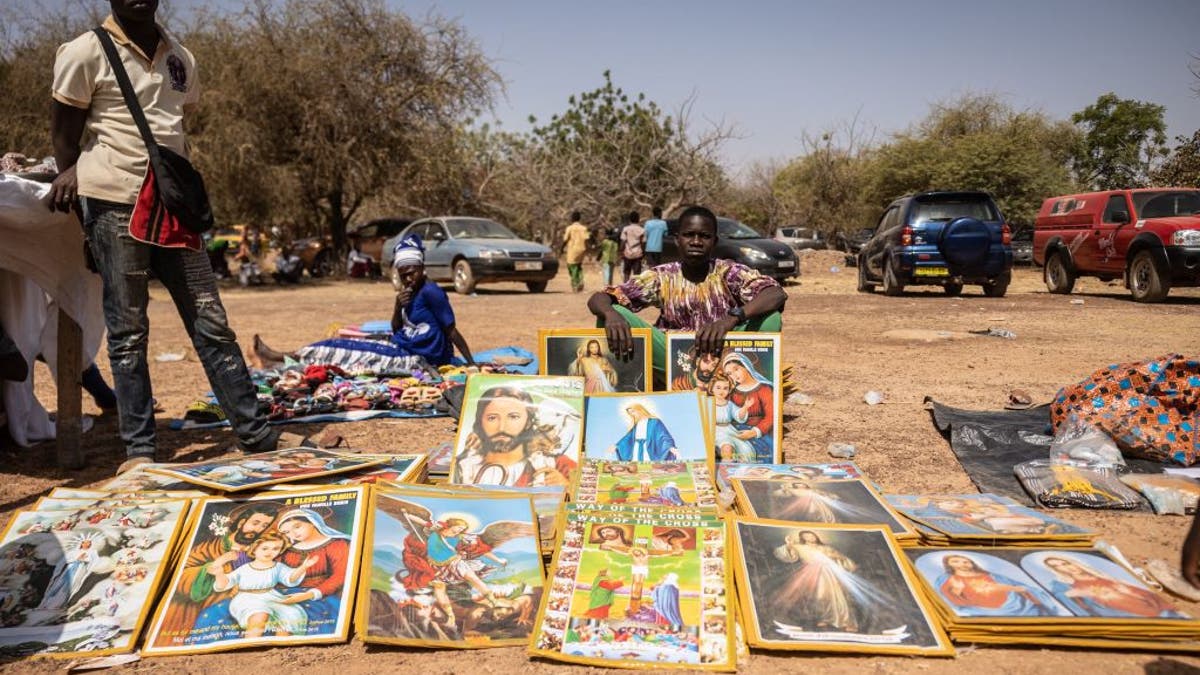
A boy sells objects of piety during a pilgrimage to Yagma on the outskirts of Ouagadougou, on Feb. 5, 2023. Thousands of pilgrims from several dioceses of Burkina Faso prayed for peace on February 5, 2023 at the national pilgrimage of Yagma, on the outskirts of Ouagadougou. The Marian shrine of Yagma has hosted the Christian pilgrimage every year at the beginning of the year for more than fifty years. The national pilgrimage takes place every three years. (Photo by OLYMPIA DE MAISMONT/AFP via Getty Images)
While neither the ICC report nor the PRC report were able to break down the exact rates of how many Christians, versus Muslims, or others, were targets of harassment, the PRC found that Christians are targeted in more countries by governments or “social groups” than any other religion, with Muslims coming in second and Jews third.
“In many authoritarian states, Christianity is seen as a proxy for Western influence and values, which regimes often reject as imperialistic or destabilizing,” King told Fox News Digital. “Christianity and other faiths emphasize allegiance to a higher moral authority, which inherently challenges authoritarian regimes that demand complete loyalty to the state.”
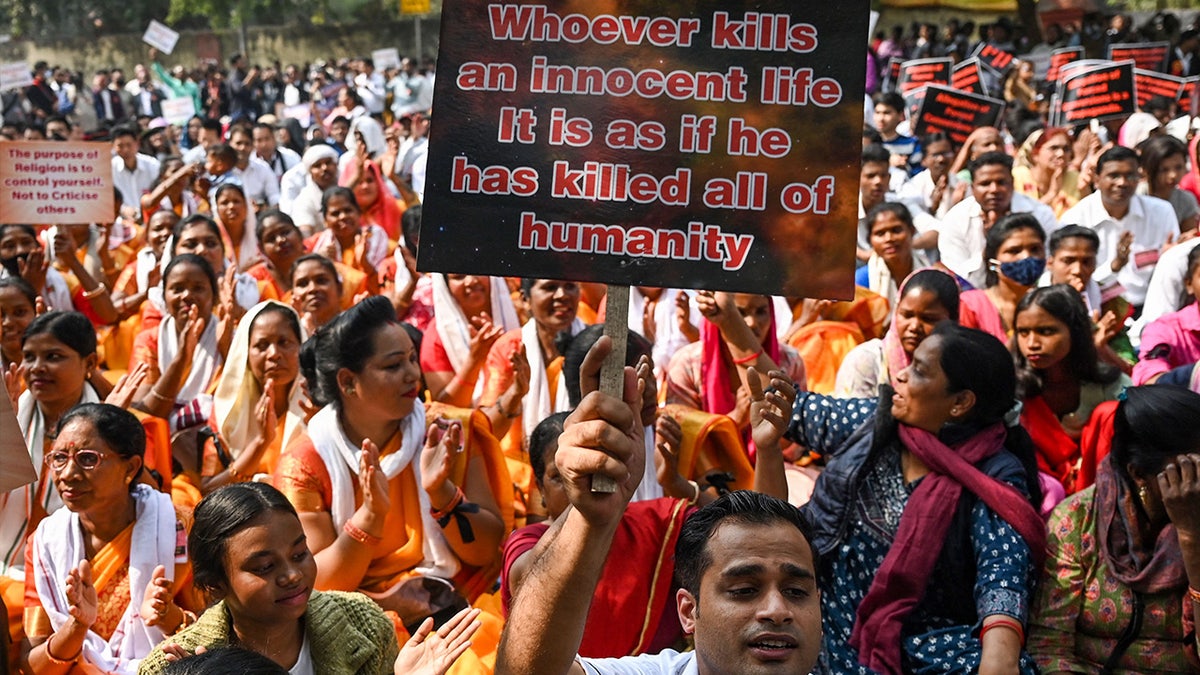
Activists and members representing the Christian community display placards as they take part in a peaceful protest rally against what they claim as an increase in hostility, hate and violence against Christians in various states of the country, in New Delhi on Feb. 19, 2023. (Photo by ARUN SANKAR/AFP via Getty Images)
POPE FRANCIS KICKS OFF HOLY YEAR AT VATICAN WITH OVER 32 MILLION VISITORS EXPECTED
However, while authoritarian attempts to control the hearts and minds of its citizens through oppressive policies are nothing new, emerging and increasingly accessible technology has upped the level to which nations can persecute perceived dissidence.
Technology like social media in many ways has improved freedom of speech and access to information worldwide, but the expansion of other technologies has also increased oppressive authoritarian systems of hyper-surveillance – even in regions not traditionally seen as religiously oppressive, like Latin America.
“Countries like Nicaragua and Venezuela, traditionally Christian-majority nations, saw a big increase in hostility toward religious groups critical of authoritarian regimes,” King said. “The targeting of religious citizens and suppression of dissenting voices marked a new and alarming trend.
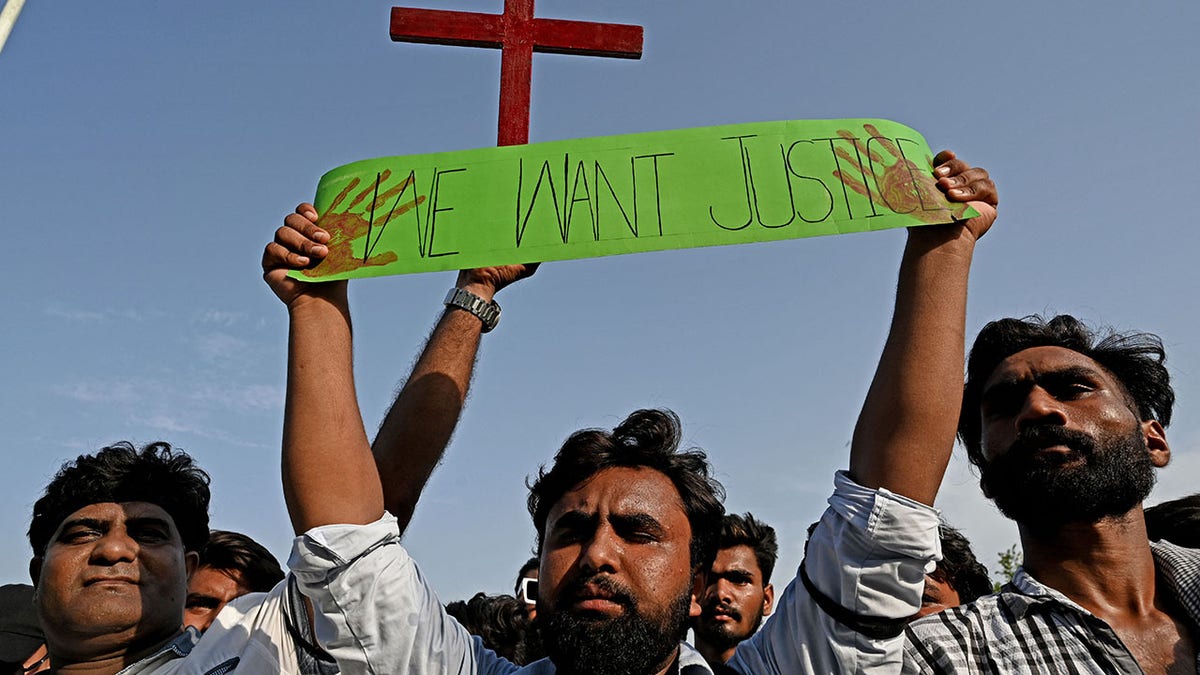
Christians demanded justice during a protest in Islamabad condemning attacks on churches in Pakistan, on Aug. 20, 2023. (AAMIR QURESHI/AFP via Getty Images)
“Nations like China exported sophisticated surveillance technology to other authoritarian regimes, enabling tighter control and monitoring of religious groups,” he added.
Some nations have increasingly viewed Christianity as a threat to their cultural norms, including India, which in recent years has seen a severe increase in the number of attacks against Christians, according to not only the ICC and the PRC reports, but also a report submitted to the United Nations General Assembly by the Human Rights Council in February.
“In countries like India and Pakistan, social media platforms were used to incite mob violence and spread disinformation about Christian communities, leading to targeted attacks,” King explained.
The violence and oppression against religious groups around the globe are not isolated events and are indicative of an increasingly growing threat reminiscent of historical atrocities carried out under similar oppressive policies.
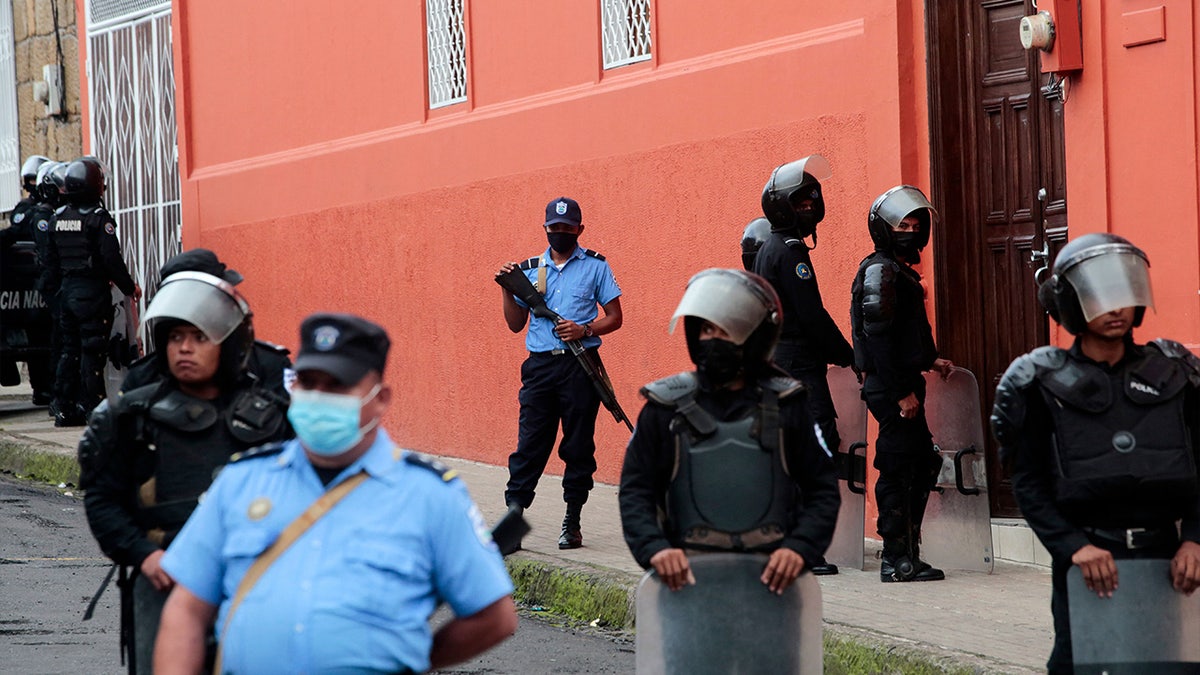
Police officers and riot police block the main entrance of Matagalpa’s Archbishop Curia preventing Monsignor Rolando Alvarez from leaving, in Matagalpa, Nicaragua, on Aug. 4, 2022. (Photo by STR/AFP via Getty Images)
“Many nations are experiencing democratic backsliding, with authoritarian leaders consolidating power and silencing dissent, including religious voices,” King explained in reference to the Soviet Union and Nazi Germany. “Economic crises, political unrest, and social inequalities create conditions where leaders seek scapegoats or distractions, often targeting religious minorities to unite the majority under their rule.
“Today’s regimes are drawing from this playbook as they face similar challenges to their authority,” he added. “Religion, with its ability to inspire freedom, hope and resistance, is viewed as a mortal enemy to their dominance.
“This trend is exacerbated by technological advancements, rising nationalism, and global instability, making the fight for religious freedom more urgent than ever,” King warned.
World
Conflicts surged across the world in 2024, data suggests
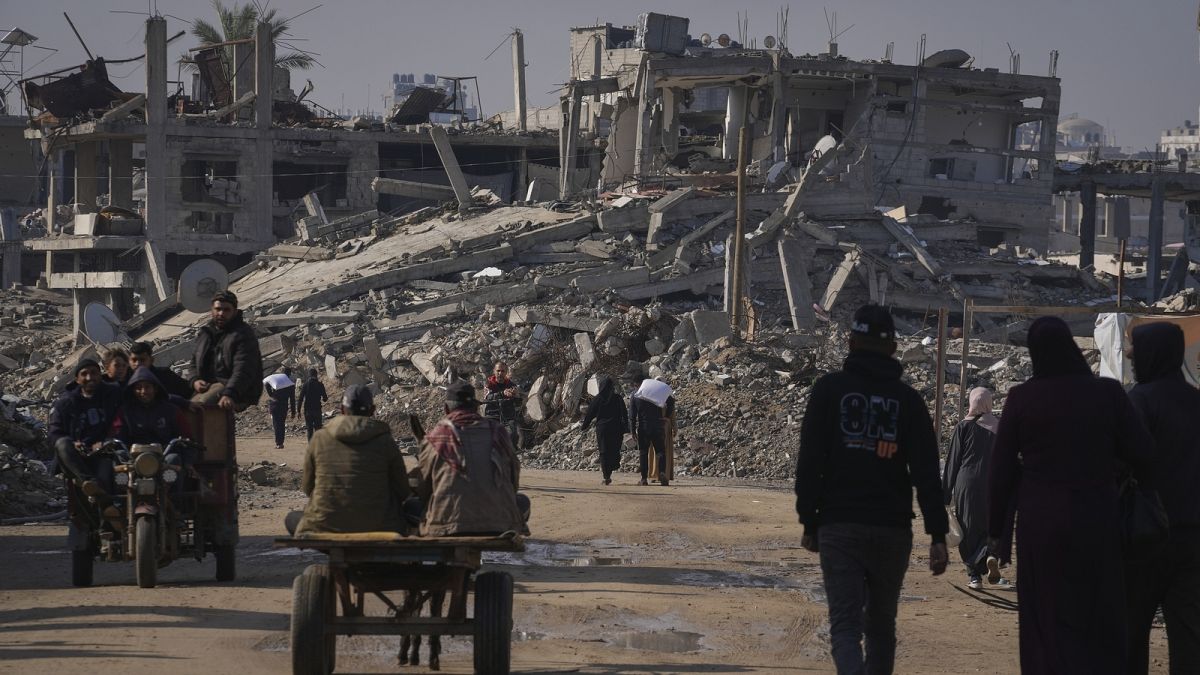
There was a steep rise in political violence over the past year, with Ukraine and Palestine considered the two major global hotspots of conflict.
The world experienced a further surge in conflicts in 2024, according to data provided by the NGO Armed Conflict Location and Event Data (ACLED), which maps conflicts across the world’s regions.
Political violence increased by 25% globally in 2024 compared to 2023, with one in eight people exposed to conflict and 223,000 people killed, according to the NGO’s estimates.
The data also suggests that there has been a two-fold increase in global conflicts over the past five years.
Another study by the International Institute for International Studies (IIIS) concludes that the intensity and human toll of armed conflicts are also on the rise, with 37% more people killed in the year leading up to June last year compared to the previous year-long period.
According to ACLED, “Palestine is the most conflict-ridden country in the world”, and “the Middle East is the most affected region”.
It bases its assessment on four indicators: the deadliness, danger, diffusion, and fragmentation of armed conflicts.
It estimates that 81% of Palestine’s population is exposed to conflict, with 35,000 fatalities recorded in the past 12 months. On average, 52 conflict incidents occur in Palestinian territories per day.
Since the war between Hamas and Israel broke out in October 2023, the UN estimates that more than 45,000 Palestinians have been killed in Gaza. ACLED puts the figure of fatalities in the Palestinian territories — including the West Bank and East Jerusalem — at over 50,000.
Meanwhile, the war in Ukraine continues to be the deadliest in the world, while Myanmar, where internal conflict has been raging since the military staged a coup in 2021, has the highest number of armed groups.
Where else are conflicts deepening?
There are an estimated 50 countries worldwide experiencing active conflict.
While Ukraine and Palestine are considered the two major global hotspots of conflict, analysts say other regions of the world are increasingly vulnerable to uprisings.
According to ACLED’s Conflict Watchlist for 2025, Mexico and Colombia in the Americas, Pakistan in Asia and Sudan, Sahel and the Great Lakes region of Africa are also “crisis areas” likely to evolve over the next 12 months.
Also on the watchlist are Myanmar, Ukraine, Iran and its allies, Israel, Gaza, the West Bank and Lebanon.
The UN estimates that 305 million people will require humanitarian assistance in 2025, as their needs are further driven by conflict and violence.
The Centre for Strategic and International Studies warns that the humanitarian needs of people in places such as Gaza, Myanmar, Sudan, and Ukraine will “likely remain severely underfunded despite obligations to protect the delivery of humanitarian aid under international humanitarian law.”
-
/cdn.vox-cdn.com/uploads/chorus_asset/file/25672934/Metaphor_Key_Art_Horizontal.png)
/cdn.vox-cdn.com/uploads/chorus_asset/file/25672934/Metaphor_Key_Art_Horizontal.png) Technology1 week ago
Technology1 week agoThere’s a reason Metaphor: ReFantanzio’s battle music sounds as cool as it does
-

 News1 week ago
News1 week agoFrance’s new premier selects Eric Lombard as finance minister
-

 Business1 week ago
Business1 week agoOn a quest for global domination, Chinese EV makers are upending Thailand's auto industry
-

 Health5 days ago
Health5 days agoNew Year life lessons from country star: 'Never forget where you came from'
-
/cdn.vox-cdn.com/uploads/chorus_asset/file/24982514/Quest_3_dock.jpg)
/cdn.vox-cdn.com/uploads/chorus_asset/file/24982514/Quest_3_dock.jpg) Technology5 days ago
Technology5 days agoMeta’s ‘software update issue’ has been breaking Quest headsets for weeks
-

 World1 week ago
World1 week agoPassenger plane crashes in Kazakhstan: Emergencies ministry
-

 Politics1 week ago
Politics1 week agoIt's official: Biden signs new law, designates bald eagle as 'national bird'
-

 Politics6 days ago
Politics6 days ago'Politics is bad for business.' Why Disney's Bob Iger is trying to avoid hot buttons











